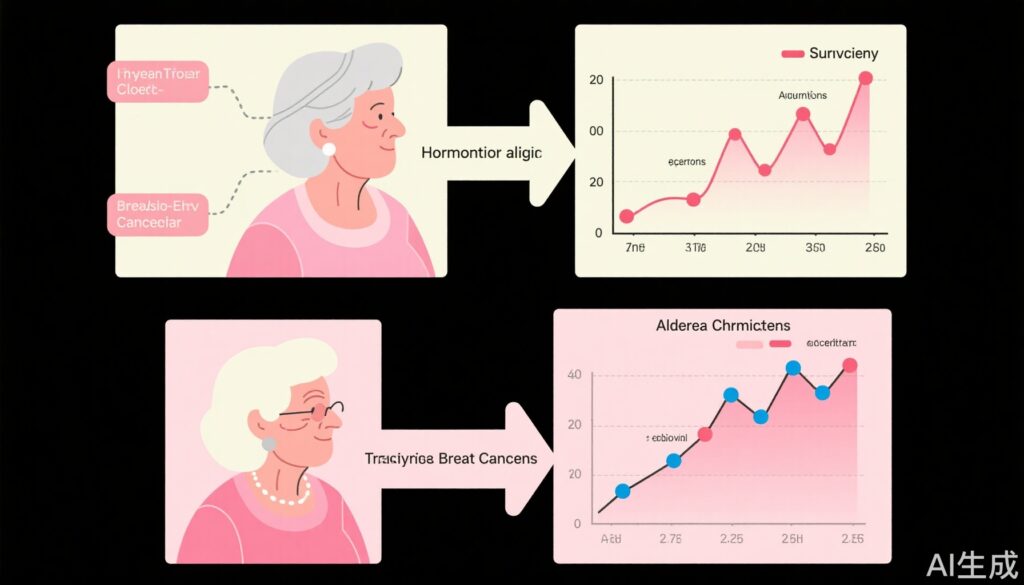Highlights
- Adjuvant chemotherapy did not significantly improve overall survival over hormonotherapy alone in women aged 70 and above with high-risk ER-positive/HER2-negative breast cancer as defined by the genomic grade index (GGI).
- Adverse events were substantially higher in the chemotherapy group, with no clinically meaningful survival gain.
- These findings challenge the routine use of adjuvant chemotherapy in this older, genomically high-risk population and inform patient-centered decision-making.
Study Background and Disease Burden
Breast cancer remains the most frequently diagnosed malignancy among women worldwide, with incidence rising with age. Older women (aged 70 and above) represent a growing demographic in clinical practice. Estrogen receptor-positive (ER+), HER2-negative breast cancer is predominant in this age group, and adjuvant hormonotherapy is the established cornerstone of management. However, about 15-20% of these patients are considered at high risk for recurrence based on clinical and, increasingly, genomic criteria such as the genomic grade index (GGI). The clinical benefit of adding cytotoxic chemotherapy to hormonotherapy in older women—especially those with genomically high-risk disease—remains controversial due to limited prospective data, increased comorbidities, frailty, and the competing risk of non-cancer mortality. The ASTER 70s trial directly addresses this evidence gap.
Study Design
The ASTER 70s study was a phase 3, multicenter, randomized, superiority trial conducted across 84 sites in France and Belgium. Eligibility included women aged 70 years or older with surgically treated, primary or locally recurrent, ER-positive, HER2-negative breast cancer deemed high-risk by the GGI, a prognostic genomic signature derived from an eight-gene reverse-transcriptase PCR assay performed centrally. Key exclusion criteria included prior systemic therapy and incomplete resection. Participants with GGI high-risk tumors (n=1,089) were stratified by geriatric frailty (using the G8 screening tool), nodal status, and study center, and randomized 1:1 to:
- Chemotherapy group: Four cycles of taxane- or anthracycline-based chemotherapy (every 3 weeks) followed by adjuvant hormonotherapy
- No chemotherapy group: Adjuvant hormonotherapy alone
The primary endpoint was overall survival (OS); safety and tolerability were also rigorously assessed.
Key Findings
Among 1,969 screened patients, 1,089 with GGI high-risk breast cancer were randomized (541 to chemotherapy, 548 to hormonotherapy alone). The median age was 75.1 years (IQR 72.5–78.7), and 40% met criteria for geriatric frailty (G8 score ≤14). With a median follow-up of 7.8 years (95% CI 7.5–7.8), survival outcomes were as follows:
- 4-year OS: 90.5% (chemotherapy) vs. 89.3% (no chemotherapy)
- 8-year OS: 72.7% (chemotherapy) vs. 68.3% (no chemotherapy)
- Hazard Ratio (HR) for OS: 0.83 (95% CI 0.63–1.11); stratified log-rank p=0.2100
The absolute difference in OS at 4 years was 1.3 percentage points (95% CI −2.4 to 5.0), and at 8 years was 4.5 percentage points (95% CI −2.1 to 11.1)—both statistically non-significant. Subgroup analyses did not reveal any group with a significant survival benefit from chemotherapy.
Safety outcomes favored the hormonotherapy-alone group:
- Grade ≥3 adverse events: 34% (chemotherapy) vs. 9% (no chemotherapy)
- Deaths related to treatment: 1 (chemotherapy group)
- Other serious complications: Higher rates of hematologic, infectious, and functional decline in the chemotherapy arm
These results highlight the increased toxicity burden of chemotherapy without meaningful survival gain in this population.
Expert Commentary
Current guidelines, including those from the American Society of Clinical Oncology (ASCO) and ESMO, recommend considering adjuvant chemotherapy for high-risk ER+/HER2- breast cancer, but evidence for the elderly remains sparse. The ASTER 70s trial is the largest and most definitive study to date specifically addressing this older, genomically high-risk cohort. Its findings support a more conservative, individualized approach in older women, prioritizing quality of life and minimizing overtreatment. Limitations include the lack of detailed frailty or comorbidity sub-analyses, heterogeneity in chemotherapy regimens, and possible underpowering for small but clinically relevant OS differences. However, the robust prospective design and long follow-up add significant credibility.
These results align with the principle that the absolute benefit of chemotherapy decreases with advancing age and competing risks, even in genomically high-risk disease. Shared decision-making involving geriatric assessment tools and patient preferences is essential.
Conclusion
The ASTER 70s trial demonstrates that, for women aged 70 years and older with genomically high-risk, ER-positive, HER2-negative breast cancer, the addition of adjuvant chemotherapy to hormonotherapy does not confer a significant survival benefit and increases toxicity. These findings advocate for a more restrained use of chemotherapy and highlight the importance of individualized treatment decisions based on genomic risk, comorbidities, and patient values. Further research is needed to refine risk stratification and optimize therapy for this expanding patient group.
References
- Brain E, Mir O, Bourbouloux E, Rigal O, Ferrero JM, Kirscher S, et al. Adjuvant chemotherapy and hormonotherapy versus adjuvant hormonotherapy alone for women aged 70 years and older with high-risk breast cancer based on the genomic grade index (ASTER 70s): a randomised phase 3 trial. Lancet. 2025 Aug 2;406(10502):489-500. doi: 10.1016/S0140-6736(25)00832-3. PMID: 40752909.
- Wildiers H, et al. Management of breast cancer in elderly individuals: recommendations of the International Society of Geriatric Oncology. Lancet Oncol. 2012;13(4):e148-60.
- Biganzoli L, et al. Adjuvant therapy in older women with breast cancer: evidence, controversies and future prospects. Cancer Treat Rev. 2021;98:102223.

